From how we dress to how we talk, the office culture is full of rules and guidelines that dictate how we should behave. And while some of these rules are based on common sense, others can be a bit more obscure. That's why it's important to be familiar with the various protocols, including those surrounding office food etiquette.
One of the ways we can show our professionalism and maintain a respectful environment is by following some simple food etiquette rules. After all, eating is a natural and necessary part of life, so why not ensure we do it in the most civilized way possible?
Most rules surrounding this are unwritten, so it may be hard to know if you’re on the right. So, today we're going to take a look at a few basic tips for eating in the office. By following these guidelines, you'll be able to dine easily and avoid embarrassing faux pas.
But, before we start, let's look at some credible reasons for eating at your office desk.
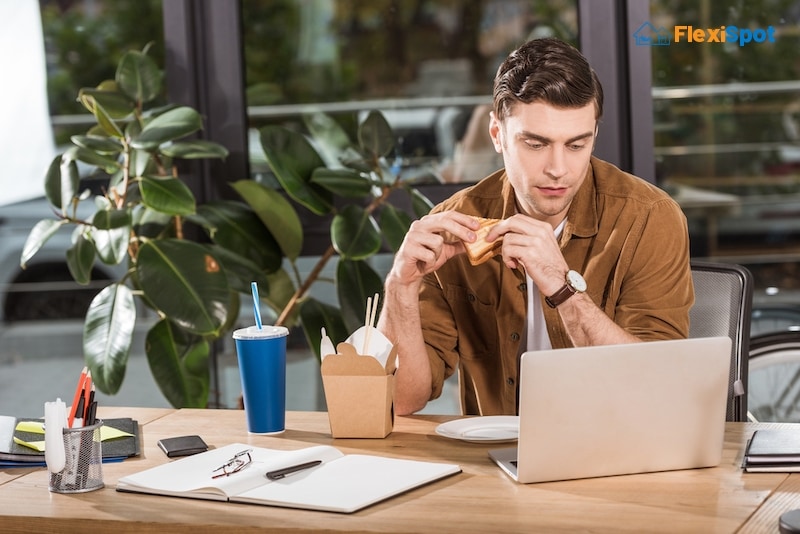
Why It May Be Justified To Eat At the Desk At Times
A recent New York Times article found that American office workers typically have unhealthy and anti-social dining habits. The article paints a grim picture of workers eating single-serve, instant meals alone at their desks, faces lit by the dull blue light of their computer screens.
While eating at your desk can reduce innovation and the collaborative spirit of shared office space, sometimes it is the only option. If you find yourself in this situation, there are some credible justifications that back you up.
For example, if you are facing a deadline or have other urgent deliverables, you may not have a choice but to eat at your desk.
Before harassing anyone, here are some almost justifiable situations that potentially cause people to eat at their desks.
You Have a Lot of Work to Do
If you have a lot of work to do and eating lunch out with colleagues would only serve as a distraction, it's perfectly understandable to eat at your desk. In today's fast-paced business world, it's all about efficiency and getting things done quickly. So if eating lunch at your desk means you can get more work done and be more productive, go for it.
But do not make it a habit, as lunch breaks are important and beneficial in many ways. For instance, they give you a chance to take a break from work, recharge your batteries, and come back refreshed and focused. Eating lunch out with colleagues can also help to build relationships and foster teamwork. So if you can swing it, try to take a break for lunch once in a while. Your body and mind will thank you for it.
You Can’t Coordinate a Lunch Group with Your Coworkers
Coordinating lunch plans with your colleagues can be difficult, especially if you have different schedules or have fussy eating habits. Not to mention, dining at a nice restaurant every day can get pretty expensive. In such cases, whipping out a sandwich at your desk might be your best bet. Plus, you can save some money by packing your own lunch.
Office Break Rooms Can Be Depressing
Office break rooms can be dull and depressing places. They often lack natural light, and the only decorations are coffee machines, fridges, and microwaves. If you dine from there, you can feel dejected and unmotivated to return to work after lunch- especially alone.
Therefore, your ergonomic office chair and desk can be a welcome getaway from the break room gulag.
Convenience
Getting a burrito, sandwich, or other fast food from the food truck on the corner is easy. Then, you can slink back into your desk to catch up on the latest gossip on Facebook. You can also listen to music or podcasts while you eat, which can help to improve your mood.
It’s Peaceful
Eating at your desk may have a bad rap. But, it’s more peaceful than contending with office politics or gossip during lunch break. It may also save the time spent on the short commute to an eatery.
That said, let’s consider the demerit of eating at your desk.
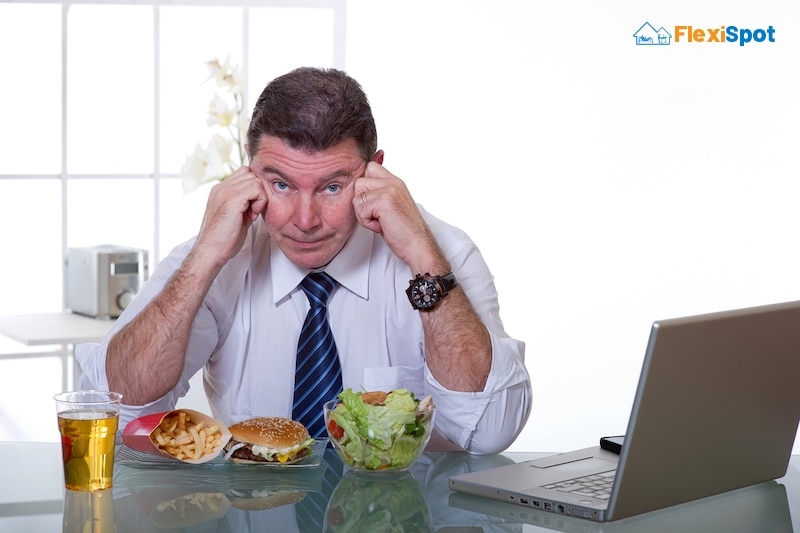
Why It's Unwise to Eat at Your Desk
Eating at our desks comes highly ill-advised. Here’s a list of reasons to get off your desk, especially during extended lunch break:
It comes with Long-Term Health Risks
Dining at your office desk means you spend more time sitting. And this affects your health more than you think. According to the Washington Post, sitting for more than 6 hours per session leads to higher blood pressure and cholesterol levels. This elevates the risk of heart disease and a host of other blood circulation and respiratory issues.
Sedentary muscles don’t react effectively to insulin, which shifts your liver and pancreas into overdrive – causing diabetes and related conditions. So, eating lunch at your desk eventually takes more time out of your life than what you intend to save.
Achy Joints
Eating at your desk also comes with significant short-term consequences. Sitting for long hours in front of a desk causes muscle tension and sore joints. It weakens your spine, hip, and the core muscles that move these joints leading to issues everywhere.
So, what can you do? Consider getting up to stretch every 20 minutes or so. Or go for a walk during your lunch break. Even brief periods of activity can make a difference.
A Lack of Structure and Workplace Balance
It's no secret that establishing a good work-life balance is the key to avoiding burnout. However, what often gets overlooked is the importance of having a good balance within your work day as well. Too often, we get caught up in the mindset that we have to power through our work with no breaks in order to be productive. But this is actually counterproductive.
Taking regular mini-breaks throughout the day can help refresh and refocus your mind so that when you return to your tasks, you're able to engage with them more effectively. Something as simple as going for a quick walk or making personal phone calls during break times can make all the difference.
Stress
Eating lunch at your desk can make your job more stressful. This is especially true if you don’t take breaks to turn off work mode. When you eat in a comfortable and relaxed ambiance, you get fully satiated by your meal, which leads to the secretion of serotonin and other "happiness hormones.”
That’s why eating something as simple as a taco or sandwich outside the office hits differently.
It Drains Productivity
Multitasking may seem like a great way to get things done, but in reality, it can be a major productivity killer. Studies have shown that trying to focus on multiple tasks at once can lead to decreased efficiency and errors. When we multitask, our brains are actually switching back and forth between tasks, which takes up valuable time and energy. This can lead to mental fatigue and make it difficult to stay focused on any one thing. We also tend to drop crumbs and spill soups as we eat, even with the best table manners, so you may end up with more cleaning to do, which detracts from your time. Hence, it fuels a vicious circle of stressful conditions.
The Do's and Don’ts of Bringing Food to the Office
You can be perceived as disrespectful by your co-workers by heating up your smelly leftovers in the shared office kitchen. Here are a few other dos and don'ts that will keep you on the right side of unspoken office policy when bringing food to the office:
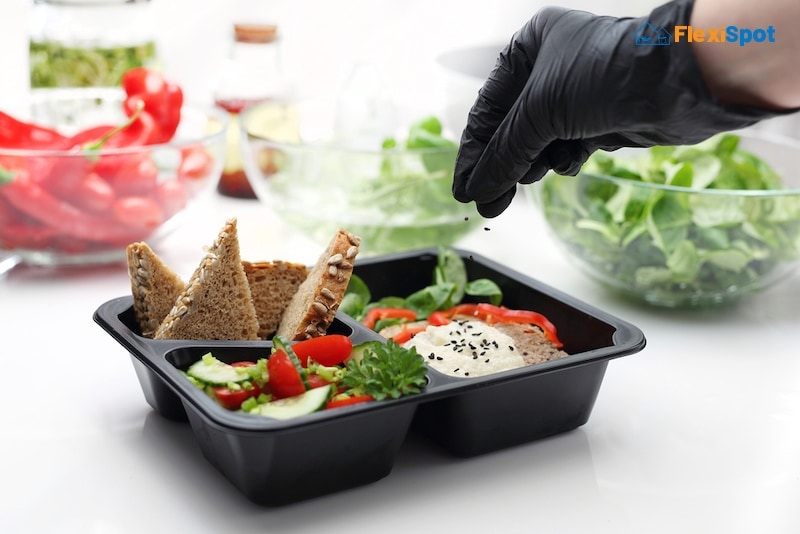
Do:
Plan your meal in advance
This will help you avoid last-minute trips to the vending machine or convenience store, which are often unhealthy and expensive.
Deli meals are quick and convenient. But, they are not as nutritious, healthy, or hygienic as the food you can prepare at home. So take some time to plan your lunch to ensure it’s healthy and cost-effective. Try to pack a nutritious lunch that will give you sustained energy throughout the afternoon. Include lean protein, complex carbs, and healthy fats to keep your brain and body fueled.
When in a pinch, a healthy green salad or muesli can get you through the day. And if you're looking for something more exciting than a boring old salad, there are plenty of recipes online that can help you mix things up.
Food Storage Options
Do invest in some quality storage containers. Look for airtight and leak-proof containers, so you can pack soups and sauces without worry.
If you're using a refrigerator at work, ensure it's clean and well-maintained. If not, consider investing in a small cooler or thermal lunch bag. Whatever storage option you choose, be sure to wrap up your food securely to keep it fresh and prevent leaks or spillage.
Get Out Occasionally
Eating lunch during busy days when tasks inundate you can help preserve your bottom line. But, this can't be every day of your career. There will undoubtedly be days when your schedule allows you to take a break.
Venture out to the food truck or communal kitchen, or even plan with workmates during such days. Enjoy the change of scenery, conversations, and different flavors. Odds are you’ll come back less stressed and ready to dispense with the job.
Remember Your Table Manners
Table manners are just as important in the office as they are at home. Just because you're eating at your desk doesn't mean you can ditch the manners your mother taught you. That means no talking with your mouth full, no licking your fingers, and definitely no belching or burping.
Also, try to eat quietly. If you're munching on chips or chewing on an apple, make an effort to eat slowly and chew with your mouth closed. No one wants to hear you slurping or crunching while they're trying to concentrate on their work.
Do Clean Out Your Fridge Regularly.
If your office fridge is crammed with old food, it's time for a spring cleaning! Throw out anything that's past its expiration date, and make sure to wipe down the shelves to prevent any cross-contamination.
Comply with Company Protocol
It's always a good idea to know your company's stance on eating at work before you show up with a sack lunch. Some organizations allow snacking at desks, while others prefer it when their workers use the break rooms for meals. Others don't have break rooms yet still discourage eating at one's desk.
The best way to find out is to consult your company's employee handbook or have a conversation with human resources. That way, you can make sure you're in compliance with company policy and avoid any potential awkwardness. After all, nobody wants to be the office pariah because they broke the rules!
Avoid bringing Foods that May Trigger Allergies
At some point or another, we've all been that person who brings in food to the office that contains an allergen without realizing it. It's easy to do and not always intentional, but it can be a real problem for those with allergies. If you must bring in something containing an allergen, clearly label it so that everyone knows what's in it. And of course, if you have any allergies yourself, be sure to let your co-workers know so they can be aware of what not to bring in.
Clean up After Yourself
Finally, clean up after yourself. Food waste can get messy, but that shouldn’t always be the case. Sloppiness annoys everyone and is highly inconsiderate of your co-workers and the janitors. When you're finished eating, dispose of all wrappers and garbage in the proper receptacle. Don't leave your dirty dish in the sink for someone else to wash. And if you're going to heat up your food in the microwave, make sure to wipe down the interior when you're done. Your workmates will be grateful, and you can keep your office vermin-free.
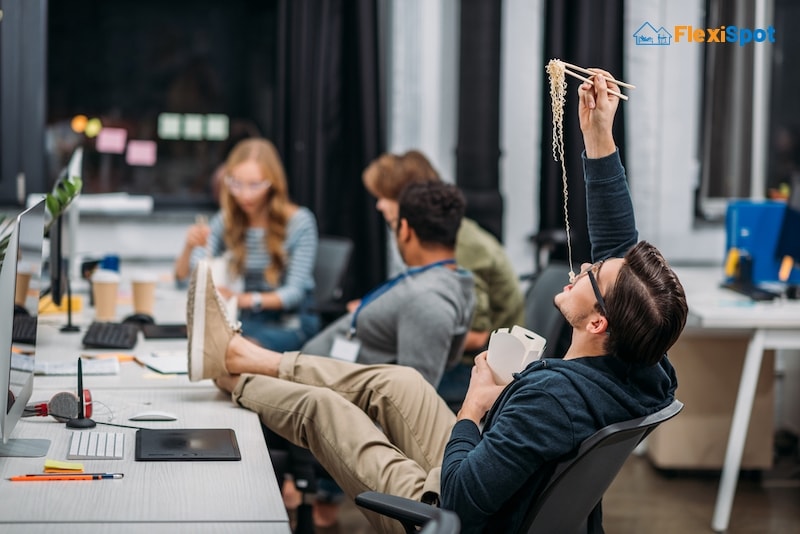
Don’t:
Be Inconsiderate of Others
If you know that certain foods have a strong smell, try to eat them away from others. No one wants to smell your garlicky lunch all afternoon. And, whatever you do, resist the temptation to heat up smelly foods in the communal microwave. Not only will the scent linger for hours, but you'll also make yourself popular with the cleaning crew.
So, the next time you're packing your lunch, ask yourself if your food choices are likely to offend your coworkers. If in doubt, err on the side of caution and save it for later. Also, if you're eating something messy, like spaghetti, be sure to clean up any spills immediately.
Steal Other People’s Food
We've all been there. You're rummaging through the fridge, looking for something to eat, when you come across a delicious-looking dish that you didn't put there. Your first instinct is to grab it and dig in, but resist the urge! Unless you're 100% sure that the food is fair game, it's best to assume it belongs to someone else.
So how can you tell if the food is up for grabs? One easy way is to check for a name or initial on the container. If it's clearly marked with someone else's name, then it's best to leave it alone. Even if there's no label, it's still courteous to ask whose food it is before helping yourself. Chances are, the owner won't mind if you take a little taste - but it's always best to check first.
Hog The Fridge Or Microwaves
In any shared workspace, it's important to be considerate of your fellow employees. This is especially true in the kitchen, where people have to share limited resources like the fridge and microwave. Unfortunately, a few people always seem to think that the rules don't apply to them.
They will hog the fridge, leaving no space for anyone else, or they will monopolize the microwave, making it impossible for others to heat their food. Not only is this inconsiderate, but it can also lead to conflict and tension in the office.
So if you want to avoid becoming the office ogre, be mindful of your impact on others in the kitchen.
Eat In Front Of Clients or Customer
Sipping on water or coffee or water is acceptable during in-person meetings. However, most people draw the line at talking to people with mouthfuls of food. So, never eat in front of customers.
The same goes for eating while talking on the phone while serving customers. Also, avoid sucking loudly at candy or chewing bubblegum during such interactions – it’s very unprofessional behavior.
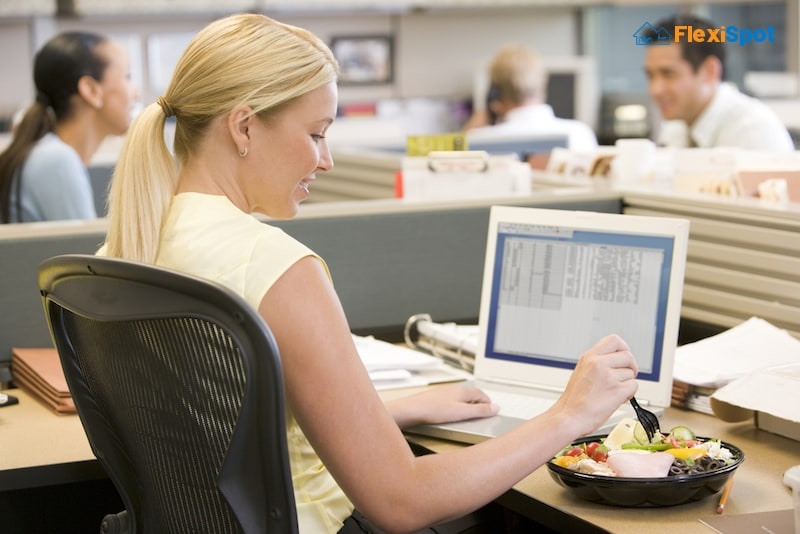
Ergonomic Tips for Eating At Your Desk
Ergonomic experts discourage eating at your desk. However, we don’t live in an ideal world where everything meets expectations. So, here are a few tips to ensure you don’t compromise your health and comfort when going against the ‘doctor’s recommendation.’
1. Don’t Recline Too Much
Most ergonomic office chairs offer a tilt factor of over 45 degrees. So, it may be tempting to recline all the way back to boss mode. However, our bodies were designed for us to eat while in an upright position.
Going against this causes obstacles in your esophagus (food pipe). This can trigger indigestion, acid reflux, and even inflame ulcers. So, sitting upright is the more ideal way to eat, and you can recline afterward for a little stretch.
2. Stretch
You’ll still sit for long hours even if you manage to leave the office for lunch. Aside from getting off your desk, consider doing a few stretches. Such a move ensures increased blood circulation, relieving all those tense muscles.
3. Consider Getting a Standing Desk
Are you often cooped up in your office? Then it would be best if you considered upgrading to a standing desk. This allows you to stand up regularly to counteract the negatives of sitting all day. Why not add an under-the-desk bike while you’re at it? Your body will thank you, and you can justify spending lunch at your desk.
Final Verdicts
Gone are the days when people did their networking over lunch and virgin martinis. Our digital reality allows us to do that over social media. And, there’s so much to do and no time. So, don’t cringe from opening that Tupperware dish or brown bag come lunch hour–you need that fuel to power you, though remember these simple tips to help make your office lunch a little more civilized. And who knows? You might even make a few new friends along the way due to your good food etiquette.